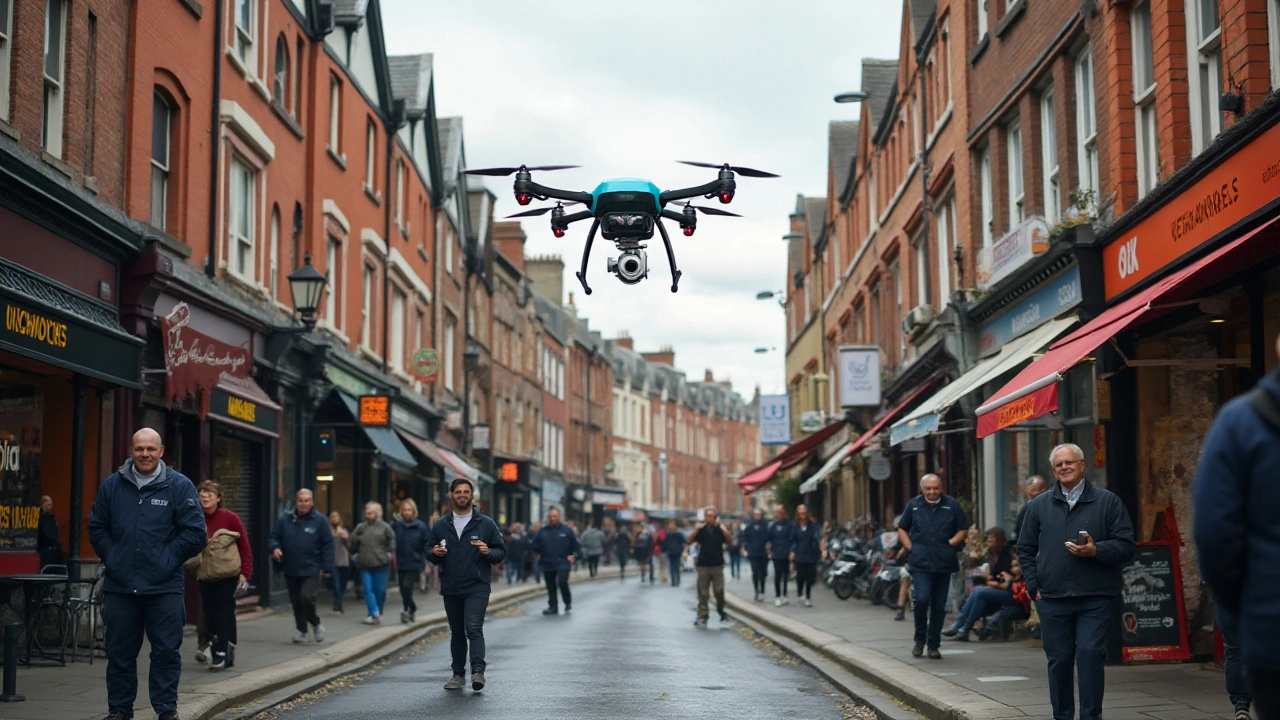In the bustling world of business today, there's a buzzword that keeps cropping up everywhere—Artificial Intelligence. Once the stuff of science fiction, AI is now a game-changer, simply shaping how companies operate across the globe. If harnessed correctly, it can transform the very fabrics of your business strategy.
The benefits are undeniable, from automating mundane tasks to delivering rich data insights that guide strategic decisions. But knowing where to start can be daunting. In this article, you'll find practical tips to tap into AI's full potential, from improving customer interactions to streamlining your internal processes.
It's about moving beyond the fear of the unknown and embracing technology that can make businesses not only survive but thrive. So, dive in and discover how AI can elevate your business strategy to new heights.
- Understanding AI's Impact on Business
- Leveraging AI for Customer Experience
- Optimizing Operations with AI
- AI-Driven Decision Making
- Future-Proofing Your Business with AI
Understanding AI's Impact on Business
Artificial Intelligence is no longer a distant dream; it’s part of our contemporary reality, weaving itself into the fabric of everyday business operations. The transformative power of AI has reached its pinnacle in recent years, enabling innovations that were once unimaginable. From small startups to industry giants, companies are incorporating AI to redefine their objectives and achieve a competitive edge. As we explore AI’s impact on business, it’s crucial to recognize how this technology is revolutionizing traditional models. It doesn't just stop at automation but extends into improving decision-making through predictive analytics, enhancing customer service with chatbots, and elevating marketing efforts by delivering personalized experiences. Embracing AI strategically opens up new avenues for driving efficiency and profitability.
The implications of integrating AI into business operations are profound and multifaceted. Start with how AI aids in making data-driven decisions—arguably one of its most significant impacts. Businesses today generate massive volumes of data, and AI systems can analyze this information with superb accuracy and speed compared to a human analyst. This capacity for AI-driven decision making enables companies to tailor their strategies more precisely and allocate resources where they will be most effective. As a result, businesses can significantly reduce waste and increase their return on investments.
Gartner predicts that by 2025, AI will deliver $2.9 trillion in business value and recover 6.2 billion hours of worker productivity globally, highlighting AI's formidable influence.
Beyond decision-making, AI has revolutionized customer interactions, rewriting the rules of engagement. Modern consumers demand speedy responses and personalized experiences—expectations that AI-powered tools are perfectly equipped to fulfill. Through AI chatbots and virtual assistants, businesses can offer round-the-clock support that enhances customer satisfaction and loyalty. An AI-powered customer service platform can manage thousands of inquiries simultaneously, significantly reducing wait times and costs. Even more intriguing is the ability of AI to anticipate customer needs based on previous interactions and purchases. By analyzing purchasing behavior and feedback, AI algorithms can suggest products or services before the customer even realizes they need them, thus providing an unmatched level of personalization.
As AI continues to pervade various facets of business, it's also redefining the workforce. While some predict doom with AI replacing human jobs, what is increasingly seen is a shift rather than a sheer reduction. AI handles repetitive and mundane tasks, freeing employees to focus on more complex, creative, and rewarding tasks. This shift not only boosts employee morale but also drives innovation as humans are free to explore ideas previously constrained by time and workload. Hence, strategically embedding AI into a business model can transform the organizational culture itself, fostering a more engaging and productive work environment.
Finally, a look at the logistical and operational side of things reveals AI’s pivotal role. In sectors like manufacturing and supply chain, AI is being utilized to predict machine failures through predictive maintenance, thus minimizing downtime. Similarly, AI logistics platforms can optimize delivery routes in real time, considering traffic conditions and weather, ensuring goods reach their destinations efficiently. In essence, AI not only improves operational efficiency but also contributes to sustainable practices by optimizing resources. By understanding and embracing the profound impact AI can have on business, companies are well poised to face the challenges and harness opportunities presented in the digital era.
Leveraging AI for Customer Experience
In today's digital age, customers expect more personalized and seamless interactions with businesses. AI tips for enhancing customer experience have become critical for any forward-thinking business strategy. With AI technology, companies can now analyze vast amounts of data to understand customer preferences at an unprecedented level. This not only enables them to tailor their products and services but also anticipate future demands. AI tools like chatbots have redefined customer service, providing instant responses and resolving queries efficiently at any hour. Companies leveraging AI can analyze sentiment from social media and reviews to tweak strategies real-time, ensuring they meet customer expectations continuously. According to a report by Gartner, by 2025, customer service organizations that embed AI in their multichannel platforms will see a 25% increase in efficiency.
Implementing AI in your business isn't just about technology—it's a cultural shift towards agility and customer-centricity. When AI models predict customer behavior, businesses can proactively offer solutions before issues even arise. This pre-emptive approach reduces churn as customers feel valued and understood. An excellent example is Amazon's recommendation engine, which uses an AI-driven approach to suggest products based on prior purchase history and browsing habits. As companies adopt AI, it's essential to maintain a balance between automation and the human touch. Creating empathy-driven interactions through AI requires thoughtful programming and regular updates. By continuously feeding algorithms with real-world data, these systems become smarter and more intuitive over time.
An important aspect often overlooked is the transparency and ethical use of AI. Customers today are more informed and wary of how their data is used. Businesses need to be transparent about AI-driven decisions and ensure that these processes are bias-free and ethically sound. This builds trust and fosters long-term relationships.
As McKinsey & Company notes, 'Personalization is about more than targeting. It's about meeting customers' needs—not just predicting them.'The adoption of AI facilitates personalization at scale, but it's vital to keep the human element at the heart of each interaction. When leveraged correctly, AI not only enhances the customer experience but can transform a satisfied customer into a brand advocate, spreading positive experiences through word-of-mouth or online reviews.
In conclusion, the era of guessing how best to serve your customers is over. The world of AI opens up a treasure trove of possibilities for businesses ready to embrace change. From faster response times with AI assistants to personalized recommendations and targeted marketing, the potential of AI is vast. As businesses seek to differentiate themselves in a crowded market, those that actively leverage the power of AI are positioned to lead the pack. Ultimately, the journey towards AI integration should be seen not just as a technological upgrade but as a commitment to enhancing every customer's experience. By embedding AI insights into every aspect of interaction, businesses can create meaningful, lasting relationships with their clients.

Optimizing Operations with AI
In today's fast-paced business environment, companies are constantly seeking methods to streamline their operations. Enter AI—a powerful tool that can significantly enhance operational efficiency. By leveraging AI, businesses can automate repetitive tasks and free up human resources for more strategic roles. This isn't just about cutting costs; it's about improving productivity and profitability by allowing human talent to focus on creative and analytical aspects of a business rather than mundane duties.
There are myriad ways in which AI can optimize operations. Consider inventory management, for instance. AI algorithms can predict demand more accurately by analyzing buying patterns and external factors such as seasonality. This enables businesses to maintain optimal stock levels, reducing waste and ensuring products are available when customers need them. The power of AI lies in its ability to process vast amounts of data far more efficiently than a human ever could.
Another area where AI shines is in predictive maintenance for equipment and machinery. By using AI, companies can anticipate when a machine might fail, allowing them to perform maintenance before problems arise. This not only minimizes downtime but also extends the lifetime of equipment, resulting in substantial cost savings. Major manufacturers have noted up to a 20% reduction in maintenance costs after integrating AI solutions.
"AI allows us to operate at a level we never thought possible. It provides the insight and foresight needed to make informed decisions about our operations," said one industry leader at a recent tech conference.
The transportation and logistics sector also benefits immensely from AI. Route optimization is a perfect example of this. By analyzing traffic patterns, weather conditions, and other relevant data, AI can suggest the most efficient routes for delivery vehicles. This not only saves time but also reduces fuel consumption and environmental impact. Statistics suggest that AI-driven logistics can reduce fuel costs by up to 15%, which is a significant saving for companies with large fleets.
AI's role in enhancing cybersecurity should not be overlooked, either. In an age where data breaches can cost a company millions, AI provides intelligent monitoring that can detect and respond to threats more swiftly than traditional means. AI systems are capable of identifying unusual patterns that might suggest a security breach, ensuring that businesses can respond in real time to safeguard their assets.
Finally, the realm of human resources is another area ripe for AI-driven optimization. AI can streamline the recruitment process by sorting through applications efficiently, identifying the best candidates quicker than a traditional manual review could achieve. This allows HR professionals to focus their energies on engaging with candidates and cultivating company culture.
As technology advances, so will the capabilities of AI to optimize operations. This continual development promises even more innovative uses of AI in the business world. Staying updated with AI's capabilities and innovating accordingly is vital for any business hoping to remain at the forefront of their industry.
AI-Driven Decision Making
In the realm of strategic business development, AI-driven decision making is turning heads for good reason. Traditional decision-making processes often rely heavily on historical data and individual expertise, both of which can be limited and biased. Enter artificial intelligence, which brings the capability to analyze vast amounts of data with incredible speed and precision. With AI, businesses can unearth insights that were previously buried under layers of numbers and noise.
The advantages are manifold. For starters, AI can enhance accuracy in forecasts, allowing companies to anticipate market trends and consumer preferences with a high degree of certainty. This predictive ability is particularly valuable in the current climate, where volatility and uncertainty are the norms. A Gartner study found that by 2025, 75% of enterprises are expected to shift from piloting to operationalizing AI, driving a fivefold increase in streaming data and analytics infrastructures.
Decision-making enhanced by AI doesn't just stop at predictions. It's about optimization too. AI can suggest actionable strategies by assessing potential outcomes and risks involved with each approach. This is transformative for industries ranging from retail to finance, where understanding subtle variations in consumer behavior or market dynamics can lead to significant competitive advantages. Incorporating these insights into daily operations can lead to drastic cost reductions and improved operational efficiency.
An intriguing application of AI in decision making is in dynamic pricing models. Businesses like airlines and e-commerce platforms use AI algorithms to adjust prices in real-time, responding instantaneously to changes in demand or competitor pricing. This doesn’t just enhance profitability; it ensures fairness and transparency in pricing strategies too, ultimately fostering trust among consumers.
Moreover, AI's role isn't constrained to high-level decisions. It's embedding itself into the fabric of everyday processes. From supply chain logistics to HR recruitment strategies, integrating AI allows for responsive, adaptable, and timely decision-making. A company can, for instance, optimize its inventory levels based on AI-driven sales forecasts, reducing waste and enhancing customer satisfaction by ensuring product availability.
- Predictive Analysis: AI can predict what products customers are most likely to buy, allowing businesses to tailor their marketing strategies appropriately.
- Operational Efficiency: AI suggests the most efficient routes for logistics, saving time and reducing costs.
- Market Adaptability: AI helps businesses swiftly adapt to new market conditions, offering flexibility that is crucial in today's fast-paced world.
"AI doesn't eliminate jobs; it redefines them. It's about enhancing human capability to achieve exceptional results." - Sundar Pichai, CEO of Alphabet Inc.
AI-driven decision making is not just a futuristic fantasy; it's very much a present-day reality that is reshaping the business landscape. As companies continue to adopt AI technologies and refine their use, the potential for innovative decision-making strategies only grows. Embracing these changes and adapting them to fit unique business contexts will be a critical differentiator in the years to come.

Future-Proofing Your Business with AI
As we stand on the brink of rapid technological evolution, one thing is certain: to remain competitive, businesses must evolve alongside AI. More than just a tool, AI is becoming a partner in innovation, revolutionizing industries one by one. It's crucial to understand how your business can not only implement AI but integrate it in a way that anticipates and adapts to future demands.
Staying ahead with AI requires a conscientious approach. Businesses need to be proactive in understanding how AI can impact their sector. This begins with identifying key areas where AI can add value, such as enhancing operational efficiency, improving decision-making, and creating a more personalized customer experience. As AI tools become more accessible, companies should focus on strategic integration rather than blanket implementation.
One strategy to future-proof your business is by investing in talent development. Training your team to use AI effectively is just as important as the technology itself. Employees at every level should be familiar with AI, from understanding basic concepts to knowing how to leverage AI tools within specific roles. By ensuring your team is equipped with these skills, your business will be better prepared to capitalize on new AI advancements as they arise.
Adopting a culture of continuous improvement is also essential. In an AI-driven market, agility is king. Businesses must be ready to pivot and experiment with different AI applications. This might mean running pilot programs in niche areas before wide-scale adaptation. Use analytics to track performance and make data-driven decisions. Companies willing to adjust both their technology and mindset will find themselves ahead of the curve.
"AI is not just another technology frontier; it is the new business foundation," says Satya Nadella, CEO of Microsoft.This understanding is paramount. Businesses must not view AI as an addition but as a crucial component of their strategy. Align AI with core business goals and measure its impact continuously, ensuring it serves as a catalyst for growth, innovation, and increased resilience against market shifts.
Lastly, foster partnerships with AI specialists and consultancies. A collaborative approach can provide fresh insights and technical expertise, helping steer your AI strategy in the right direction. External partners can bring invaluable experience from diverse sectors, offering tailored solutions that internal teams may not conceive on their own.
Incorporating AI tips into your business strategy is not about having the latest tech but making informed, strategic decisions that will set your company up for long-term success. As we head deeper into the fourth industrial revolution, those who harness AI effectively, turning potential into performance, will define the future landscape of their industries.

